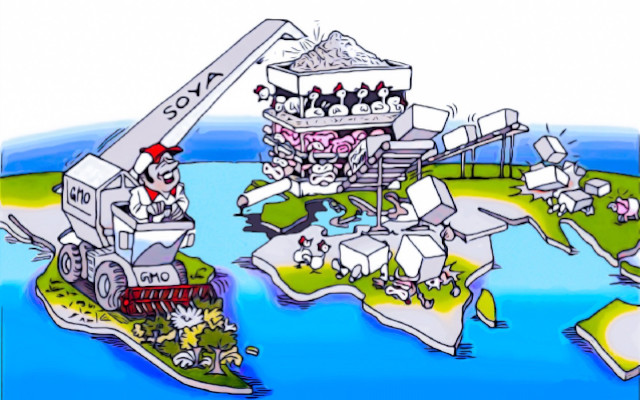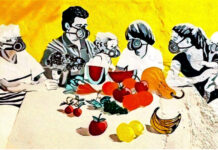Brussels has given the green light to the use of a new GMO soybean variety–resistant to dicamba, glyphosate and glufosinate ammonium–for food and feed production. (1)
Three deadly poisons may remain in products derived from a single Monsanto-Bayer patented seed. And the European Commission allows its entry into our food chain, despite the contrary opinion of the Parliament in Strasbourg.
GMO soybeans, the dicamba era is announced
Monsanto’s new patented GMO soybean (MON 87708 x MON 89788 x A5547-127) is derived from three different genetic manipulations that enable it to resist as many broad-spectrum herbicides. Not only glyphosate and glufosinate ammonium but also dicamba, the ‘poison of poisons’.
Dicamba is a highly volatile agrotoxic, as seen. That is to say, it is capable of destroying all forms of life-except plants genetically manipulated to resist it-not only on the fields where it is sprayed but also on those nearby. And that is why on 3.6.20 the U.S. judiciary canceled the authorization for its use. As Bayer tries to settle ongoing class actions with $11 billion.
Glufosinate ammonium, toxic to reproduction
Glufosinate ammonium, one of the three agrotoxics that the new GMO soybean resists, is perhaps less well known than the other two herbicides. It is mentioned in 355 European acts, as many GMO seeds that resist it are already authorized (soybean, corn, sunflower, canola, cotton). Yet its use in agriculture has been banned in the EU since July 2018 as toxic to reproduction. (2)
After all, the risk of multiple exposure to agrotoxincocktails is real and potentially serious, as Professor Alberto Mantovani of the Istituto Superiore di Sanità (ISS) has illustrated in these pages. But the institutions that are supposed to protect public health, the European Commission in the first place, persist in favoring the opposing interests of the
Big 4
. (3)
Contamination out of control
‘Pursuant to Regulation (EC) No. 396/2005 of the European Parliament and of the Council, which aims to ensure a high level of consumer protection in relation to MRLs [Maximum Residue Levels, NDR], Residues present in imported crops for food and feed purposes of active substances whose use is not authorized in the Union should be carefully controlled and monitored.
Conversely, under the Union’s most recent coordinated multiannual control program (for 2020, 2021 and 2022), Member States are not required to measure glufosinate residues on any commodity, including soybeans’.
(European Parliament, resolution 14.5.20. See footnote 4)
Opposition from Parliament and member states
The European Parliament tried to oppose the authorization of the GMO seed under consideration just four months ago. In a special resolution, approved on 14.5.20 by a large majority, the European citizens’ representatives called on the European Commission to deny authorization for Bayer-Monsanto’s new Franken-seeded derivatives.
The member states in turn did not reach a qualified majority in favor of authorization. Neither on 9.12.19, at the Standing Committee on the Food Chain and Animal Health, nor on 23.1.20 at the Appeals Committee. But the European Commission led by Ursula von der Leyen proceeded anyway, with an iron determination that betrays the ecological transition commitments declared in the strategies
Farm to Fork
(f2f) and
Biodiversity
(biodiversity).
The lies of the European Commission
The European Commission entrusts its decision in favor of Bayer – Monsanto to the opinion offered by theEuropean Food Safety Authority (EFSA). Alleging that, in the absence of a qualified adverse opinion, permission is due. False. (5)
‘Within 3 months of receiving the opinion of the Authority, the Commission shall submit to the Committee referred to in Article 35 a draft decision to be taken on the application, which shall take into account the opinion of the Authority, relevant Community legislation and other legitimate factors relevant to the matter under consideration. If the proposed decision is not in accordance with the opinion of the Authority, the Commission shall explain the reasons’ (reg. EC 1829/03. Article 7. Authorization).
Ten years of new poisons to European consumers
Authorization of the new GMO soybean is valid for 10 years. With a ban on planting and mandatory labeling of food and feed containing it and/or derived from it. And the certainty that it will become part of our food chain, at the very least through the feed of farm animals.
It is becoming increasingly clear how the European Commission responds to the orders of the United States rather than to the demands of its own citizens and their representations. TTIP will just be the icing on the poisoned cake we have become addicted to, albeit unwittingly. (5)
Dario Dongo and Marta Strinati
Notes
(1) European Commission, EU Implementing Decision 2020/1360, 28.9.20
(2) Implementing Regulation (EU) no. 540/201, laying down implementing provisions for Regulation (EC) No. 1107/2009 of the European Parliament and of the Council regarding the list of approved active substances. Testo consolidato su https://eur-lex.europa.eu/legal-content/IT/TXT/?qid=1602143534484&uri=CELEX:02011R0540-20200901
(3) Dario Dongo. Endocrine disruptors, a new database reveals Brussels’ omissions. GIFT(Great Italian Food Trade). 12.6.20, https://www.greatitalianfoodtrade.it/sicurezza/interferenti-endocrini-una-nuova-banca-dati-rivela-le-omissioni-di-bruxelles
(4) European Parliament, resolution 14.5.20 on the draft Commission Implementing Decision authorizing the placing on the market of products containing, consisting of, or produced from genetically modified soybean MON 87708 × MON 89788 × A5547-127 pursuant to Regulation (EC) No. 1829/2003 of the European Parliament and of the Council. https://www.europarl.europa.eu/doceo/document/TA-9-2020-0069_IT.html
(5) Dario Dongo (2015). GMO, The Great Scam. GIFT(Great Italian Food Trade), https://www.greatitalianfoodtrade.it/libri/ogm-la-grande-truffa.









